#colonial expeditionary force
Explore tagged Tumblr posts
Video
youtube
In today's episode, let's check out the invader factions, starting with the Colonial Expeditionary Force.
11 notes
·
View notes
Text

Yara Expeditionary Force Uniforms for the Yaran Infantry; Private, Warlock and Corporal. Much of modern Yaran military culture is taken from their prior existence as a colonial holding. After Independence, Yara continued to hold its position as a dominant power by contesting the authority of the Goblin and Halfling states around gulf region.
243 notes
·
View notes
Text
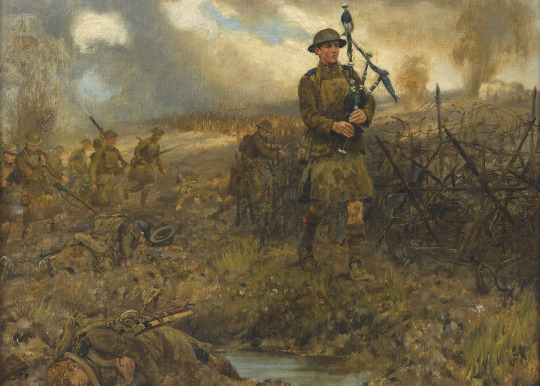
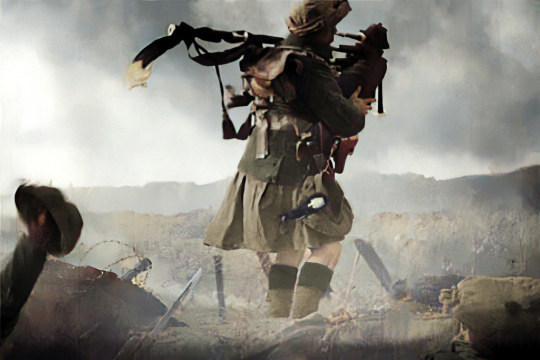
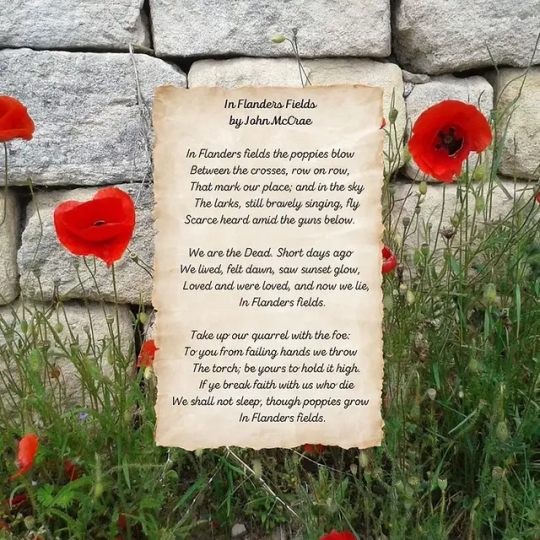
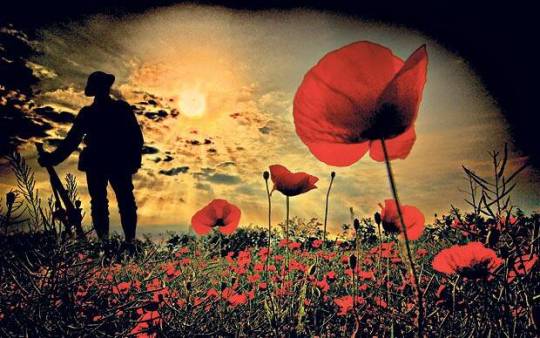
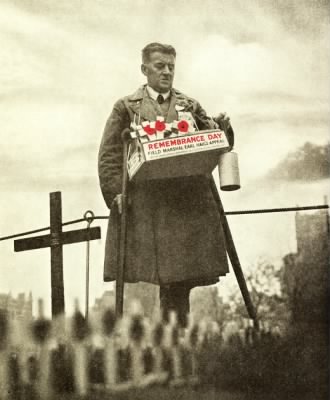
On 11th November 1918 an armistice came into force ending fighting in the First World War.
Hey! Jock, are ye glad ye ‘listed?
O Jock, but ye’re far frae hame!
What d’ye think o’ the fields o’ Flanders?
Jockey lad, are ye glad ye came?
Wet rigs we wrought in the land o’ Lennox,
When Hielan’ hills were smeared wi’ snaw;
Deer we chased through the seepin’ heather,
But the glaur o’ Flanders dings them a’!
This is no’ Fair o’ Balloch,
Sunday claes and a penny reel;
It’s no’ for dancin’ at a bridal
Willie Lawrie’s bagpipes squeal.
Men are to kill in the morn’s mornin’;
Here we’re back to your daddy’s trade;
Naething for’t but to cock the bonnet,
Buckle on graith and kiss the maid.
The Cornal’s yonder deid in tartan,
Sinclair’s sheuched in Neuve Eglise;
Slipped awa wi’ the sodger’s fever,
Kinder than ony auld man’s disease.
Scotland! Scotland! little we’re due ye’,
Poor employ and skim-milk board.
But youth’s a cream that maun be paid for,
We got it reamin’, so here’s the sword!
Come awa’, Jock, and cock your bonnet,
Swing your kilt as best ye can;
Auld Dumbarton’s Drums are dirlin’,
Come awa’, Jock, and kill your man!
Far’s the cry to Leven Water
Where your fore-folks went to war,
They would swap wi’ us to-morrow,
Even in the Flanders glaur!
Neil Munro.
I salute all the lives lost during the war but I cant see why the fighting had to continue after the Armistice had been agreed.....
The armistice was agreed at 5.10am on 11th November to come into effect at 11am. The news was conveyed around Europe within the hour. The original armistice was for a period of 36 days, after which it had to be renewed. This was done four times before the Treaty of Versailles was signed. The only problem is that the war did not completely stop at 11am on 11th November.
The Entente had already agreed armistices with Bulgaria on 29th September, the Ottomans on 30th October, and the Austro-Hungarian Government on 3rd November. Germany was the last of the Central Powers to sue for peace. The Armistice with Germany was agreed to come into effect at 11am to allow time for the news to reach combatants. However, fighting continued in several places during and after that time, including on the Western Front.
General John Pershing, Commander of the American Expeditionary Force, did not approve of the armistice. Consequently he gave no instructions to his commanders to suspend any new offensive action during the remaining hours until 11am. This gave individual commanders latitude to determine their actions in the last few hours and in some quarters there was fierce fighting up to 11am which was difficult to stop.
On 11th November alone there were nearly 11,000 casualties, dead, missing and injured, exceeding those on D-Day in 1944. Over 3,500 of these were American. Pershing had to face a Congressional hearing to explain why there were so many deaths when the hour of the armistice was known in advance, it was totally avoidable, over 11,000 families lost their fathers, their uncles, their sons and their nephews, needlessly.
An armistice is a ceasefire, not an official end to war.
Demobilisation of British, colonial and imperial troops did not finish until 1920, considerably longer than servicemen had anticipated. Although fighting continued elsewhere, the armistice between Germany and the Allies was the first step to ending World War I. The global reaction was one of mixed emotions: relief, celebration, disbelief and a profound sense of loss.
During the First World War 140,000 Scots are killed, among these figures, which vary somewhat, from to 500 to 1000, were the Bagpipers, sent “over the top” to lead the Scottish troops into battle.
Nicknamed Die Damen aus der Hölle (Ladies from Hell) by German soldiers for their distinctive tartan kilts and unparalleled bravery, the pipers from the “Black Watch”—the 3rd Battalion, Royal Regiment of Scotland—garnered a fearsome reputation on the battlefields of World War I.
Standing in full view of German soldiers, often at times armed with only their bagpipes, pipers were the first “over the top”, acting as a clarion call for troops to keep moving. The sound of the bagpipes would spread terror among the German troops—when one “Lady from Hell” fell, miraculously another piper would seemingly arise out of the trenches to take his place...............
By the time the second world war came pipers were not ordered to lead the men into battle, well except on the orders of Simon Fraser, 15th Lord Lovat whose personal piper Bill Millin, commonly known as Piper Bill who, when he questioned Lovat after being told to pipe the the men into battle on the beaches of Normandy was told, Ah, but that's the English War Office. You and I are both Scottish, and that doesn't apply"
Flowers have always held symbolism in many cultures around the world. One such flower is the red poppy, almost synonymous with Remembrance Day, observed in Canada. Poppies have become the flower of Remembrance Day for several reasons, with a significant connection to the famous war poem "In Flanders Fields" by Lieutenant Colonel John McCrae.
The poem "In Flanders Fields" describes the poppies that grewamid the graves of soldiers who died during World War I in Flanders, a region in Belgium. The poem's vivid imagery and poignant verses made poppies a symbol of remembrance for those who had lost their lives in conflict.
Flanders, where many battles of World War I took place, saw extensive destruction and loss of life. Despite the devastation, the red poppies continued to grow in the churned-up soil, a symbol of resilience and renewal. The contrast between the poppies and the war-torn landscape made them a powerful symbol of remembrance.
In 1921, the Royal British Legion adopted the red poppy as a symbol for their annual Poppy Appeal, which raises funds to support veterans and their families. The tradition of wearing a red poppy to remember the fallen and support those in need became more widespread.
The practice of wearing red poppies on Remembrance Day has been adopted by many countries around the world as a way to honor and remember those who have sacrificed their lives in wars and conflicts.
The last pic here is ex-Private H.E. Day of the 15th Hussars who lost a leg during the war selling wooden crosses)
29 notes
·
View notes
Text
Between the Black and Grey 71
First / Previous / Next
The atmosphere aboard the dreadnought was tense. There were a few moments of negotiation about whether Penny would go over to Gord's ship, or Gord to Penny's but in the end, Gord blinked first. Probably because he knew that Home still had their stardrive pointed at Penny's ship.
The ships connected, Gord and Chloe came over and were led to a conference room right off the airlock. A steward - knowing they were both AIs - offered them coffee or tea, and to her immense surprise, Gord accepted. A few moments after the coffee was delivered, Penny and Zhe came in. As she stepped in, a guard attempted to follow them, and Zhe stared at him and shook her head. His eyes flicked to Penny's and she nodded, and he saluted sharply and stepped back out.
"That was the 'this is insane, but you are the commander, so I will do what you say' salute if I ever saw one." Gord said, grinning around his coffee. Penny looked at Gord, surprised. Zhe just smirked and flicked her ears.
As they both sat Gord put his coffee down. "Feeling a little overwhelmed, Empress? It's okay, we're among friends here."
Penny glared at Gord for the barest split second, then her shoulders slumped and she leaned back in her chair, staring at the ceiling. "I have no idea what I'm doing." She said to the ceiling. Penny continued, "Fen left on the expeditionary force - I told her she didn't need to go, but she insisted, then we get an emergency beacon from the K'laxi of all people saying that they're breaking away from the Empire, oh and not only that they are fighting against the nanites - which the general public didn't know about - but now they do, and that there isn't an Empress anymore and what can we do but assume she was killed along with the expeditionary force!" She tilted her head just enough to see Gord, "they were destroyed I assume?" He nodded once. She looked back up at the ceiling. "I immediately declare myself Empress - along with about a dozen other people across colonial space and now it's a race to see who can build the largest coalition of support and-" she sighed "-probably fight a couple of civil wars before the new leader of humanity is declared." She sat up and locked eyes with Gord. "Then, I scramble to get whatever ship will let me on out to Home so I can go ask the AIs - who just recently came back and said they were willing to work with us - for help figuring out what the fuck is happening, and I get ignored and sure, maybe I overreact a little and sent a couple shots over your bow to get your attention. Someone from out past Jupiter tells me to stuff it, and then Home aims their stardrive at me. So yes Gord, I am feeling 'a little overwhelmed'" She trudges over to the sideboard in the conference room, pours a water, downs it in one gulp, pours another, and then sits back down. "So then, Gord and Chloe, representatives of the AI faction, what do you want to discuss."
Chloe shifts awkwardly in her seat. "Well, we-"
"Did you know I was a spy?" Penny said, unprompted. "My aim never was for power. I was assigned to watch Fen, keep my superiors apprised about what she was doing - mostly with her K'laxi black projects team - and to try and steer her away from any actually damaging courses of action. I wasn't supposed to fall for her!" It was practically a wail. "I know she holds a candle for her dead wife and will probably never actually love anyone else, doesn't matter I still loved her! Now, she's gone, and I don't know if she's alive or dead, and the Nanites are acting real strange and the whole thing is going to crash down, and if I survive the next year it'll be an Ancestors provided miracle." She stifled a sob and took another sip of water and sniffed. "So, if you have any idea where Fen went, please, please tell me."
Gord looked at Chloe. There was a second of them staring at eachother. Communicating? Just staring? Zhe wasn't sure. Finally Chloe blinked and scoffed. "Fine." She said.
"Well Penny - Penelope - Empress..." Gord said, kindly. "We don't exactly know... anymore."
****
Fen drifted in and out of conciseness. Her suit had her partially reclined, and she was well supported, and the suit was warm and quiet and she was so tired. So very tired. Was she sleeping, or was she passing out? Did it matter? She blinked and the gray of the virus took up a small portion of the nebula. She blinked again, and half the nebula was gray. Blinking again, it was all gray. Shit, this was bad. "Suit?" She said. "How long has it been since we linked here?"
TWENTY STANDARD SOL HOURS.
Nearly a day. Didn't feel like it. She ached, her limbs felt tired and cold and she wasn't hungry. Shouldn't she be hungry? She drank a little water from the straw near her mouth, and suddenly her mouth was incredibly parched. She sucked the water in greedy slurps until the pouch was empty. It would refill overtime from expelled moisture from her breath, and processed waste, and even from the spare oxygen and hydrogen it could capture from interstellar space, but, she might get one more pouch of water that way. If she was going to survive she needed to do something.
"But what, Fen? What the fuck do I do now?" She said to herself. There was nobody near, nobody who knew where she was - unless Gord or Chloe thought to scan for the backpack's link signature. Supposedly that was possible, but it was difficult, and not terribly accurate and would... require them knowing... she left. Dammit. Chloe knew she left, Fen thought, but she had cut her comm.
Wait a moment, the backpack had enough power for two trips, one 'there' and one 'back.' She brought up the link backpack's overlay and... yes, it could link exactly one more time.
But where?
She could link back to Sol, but would anyone be able to find her in time? Did the backpack have a directory of common locations? If she linked in the middle of the shipping lane for Parvati, would they see her, or would she just be another bit of debris destroyed by the stationkeeping lasers of a Starjumper linking in? Scrolling through the settings, Fen saw that it didn't really have a directory. The backpack was clearly one step above a prototype. There was a log of previous addresses, but they didn't detail where they were. Her only option was to wait here, and hope Gord or Chloe put two and two together and got six, or link back to Sol, and scream on comms until she died, or was rescued.
Fen sighed. Was it even a choice?
She toggled the return, and the backpack linked her away from the white hole, and the remains of the nanites.
Fen sat on the forest floor, hugging her knees. Ma sat next to her, leaning her head on Fen's shoulder. "You should be proud hon. You did it." She straightened up. "Not only that, but you did it yourself, with your own idea. It wasn't Gord's idea, or Zhe's, or Penny's or mine. It was yours."
Fen smiled as she clutched her knees. "I am pretty awesome, aren't I?"
"You know I know you are." Ma said, her ears flicking.
"But Ma, what am I going to do now? Defeating the nanites was just the start. If I get picked up, If I survive, If we can figure out the K'laxi..."
"All decisions you have the privilege, the honor to make, because you took the step to stop the nanites. Humanity is in charge of their destiny again. The other stuff?" Ma nuzzled Fen's neck. "That's just details."
Fen was in space still, but this was different. For one, the yellow-white light of Sol shone on her, warming her suit, not the sharp blue white of the white hole. For another, her comm lit up with dozens of frequencies, all clearing for the emergency trill of her rescue beacon. For a third... three quarters of Fen's view was taken up by the colony ship the AI called Home, only a couple hundred kilometers away.
Of course. She was on Gord's ship before and that was right next to Home. She'd return to the same location, and would naturally still be next to home. Fen sighed and drifted off as red and white sparkles of emergency ships soared towards her.
#humans are deathworlders#humans are space orcs#humans are space oddities#jpitha#humans and aliens#writing#sci fi writing#humans are space australians#humans are space capybaras#FlashWarp
23 notes
·
View notes
Photo
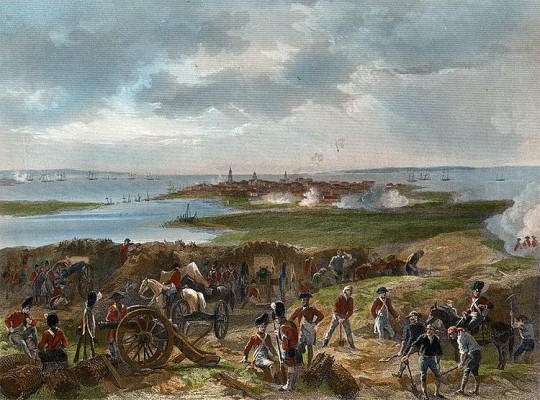
Siege of Charleston
The Siege of Charleston (29 March to 12 May 1780) was a major military operation during the American Revolutionary War (1775-1783). Hoping to establish a foothold in the American South, British commander-in-chief Sir Henry Clinton led an attack on Charleston, South Carolina, capturing the city after a six-week siege. It was one of the worst American defeats of the war.
Background: Britain Invades the South
For the first three years of the war, British strategy had focused on the northern United States, with most of the fighting taking place in the New England colonies and Middle Colonies. But after several British campaigns in the north met with failure, Britain shifted its attention to the American South. The south was supposedly bursting with Loyalists, who were awaiting the arrival of a British army to revolt en masse and cast off their revolutionary governments. Additionally, the south produced most of the profitable cash crops of the United States, including indigo, rice, and tobacco. The Americans were using the revenue from these crops to purchase war supplies. If the south were to fall under British control, therefore, the Americans would be less capable of funding their war effort.
Sir Henry Clinton, commander-in-chief of the British army in North America, decided to probe the American defenses in the south before committing to a full-scale invasion. In November 1778, he dispatched a small expeditionary force of 3,500 men to seize control of Savannah, Georgia. On 29 December, after a brief skirmish with the Americans, the British captured Savannah before consolidating their foothold in the south by occupying the surrounding towns. But their control of Georgia would not go unchallenged, as Major General Benjamin Lincoln, commander of the Southern Department of the Continental Army, was determined to prevent the state from falling back under British subjugation. After joining forces with 4,000 French troops under Charles Henri Hector, Comte d’Estaing, Lincoln laid siege to Savannah on 16 September 1779. But the siege took longer than anticipated and d’Estaing, anxious that his fleet was left vulnerable to British attack, grew impatient and ordered a direct assault. However, the Franco-American assault on Savannah, which took place on 9 October 1779, was bloodily repulsed. The dispirited allies abandoned the siege of Savannah shortly thereafter, leaving Georgia in British hands.
When Clinton heard the news of the British victory at Savannah, he was elated, referring to it as “the greatest event that has happened in the whole war” (Boatner, 988). The Savannah experiment having proved successful, Clinton immediately turned his attention toward a larger prize: Charleston, South Carolina. Boasting a population of 12,000 residents, Charleston was one of the four most important cities in British North America (the others being New York, Boston, and Philadelphia). It was the largest city in the south, its bustling port the center of much of the region’s wealth. Clinton himself had tried to capture it three years earlier but had been defeated at the Battle of Sullivan’s Island (28 June 1776); he was not about to let the city defeat him a second time. On 26 December 1779, Clinton placed German General Wilhelm von Knyphausen in charge of British-occupied New York City, leaving him with 10,000 men. Clinton, his second-in-command Lord Charles Cornwallis, and the remaining 8,500 British and German soldiers then boarded a fleet of 90 transport ships sitting in New York Harbor. Escorted by 14 Royal Navy warships under Vice Admiral Marriot Arbuthnot, the transports then weighed anchor and set sail for Charleston.
Continue reading...
21 notes
·
View notes
Text
I’ve been messing around with HeroForge again this week, as I’ve taken the whole thing as vacation for some much needed rest and decompression. These are all more general designs for troop types and uniforms during the Kais Independence War.
First up is the Kais Revolutionary Infantry- the heroic Everyman who takes up an old fashioned rifle and whatever they can get their hands on to free themselves from their colonial oppressors. I really like this helmet for the Kais forces as it has that Rebel Alliance vibes and the sort of lighter, less well equipped vibe. The actual piece is an extreme sports helmet that HeroForge says is great for paintball and motorcross, but some color adjustments and goggles up make it a solid sci-fi piece.

Up next, we have their main antagonist- the Aldottorai Colonial Trading Company trooper. Part adventurer, part mercenary, all scab- these troopers ensure security aboard the Company ships, put down opposition, and ensure that trade and profits continue smoothly.
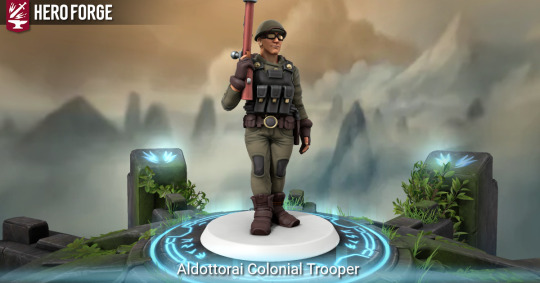
There’s not a huge difference between these and the revolutionary forces. The main one is these troops are better equipped with marching uniforms and true body armor and matching helmet. They use the same bolt action semiautomatic rifle style, but have more ammunition and protection to give them an edge over their main competitors- pirates, privateers, and other outlaws. They’re still a decently trained infantry force, however, although lacking the rigorous training and combat experience of the Aldottorai Republic’s official forces.
Speaking of them, the last one is the Aldottorai Republic Naval Fusilier. These are the elite expeditionary troops of the Republic, fresh off victories over neighboring states in the past few decades. Top of the line helmets, body armor, and submachine guns for shipboard fighting. The uniform is the deep blue of the Republican Navy, with the red epaulettes of the fusiliers.

They also have more advanced boots and supplies for the complexity of the missions they expect. Initially formed to guard naval outposts and ships, the naval fusiliers gained a reputation for fierceness and courage that created a unique esprit d’corps and led them to become the premier shock and expeditionary troops for everything from ship boardings to capital city invasions to special operations.
5 notes
·
View notes
Text
It did not take much for the massive French expeditionary force to topple the pre-colonial Ottoman regime in Algeria, as it was in fact very deylicate.
31 notes
·
View notes
Text
The Settlers review – ultra-violent study of Chile’s butchery of its indigenous people
★★★★☆ Europe’s early 20th-century exploitation of Tierra del Fuego is told in an unsparingly bloody drama-thriller by first-time director Felipe Gálvez Haberle
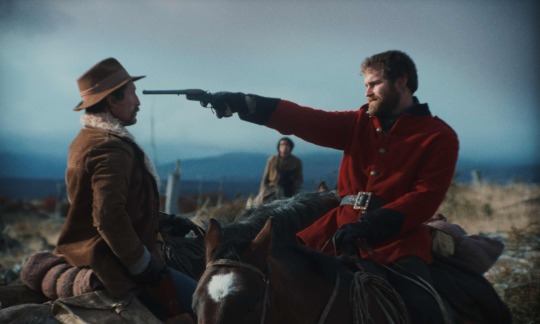
Brutish … Alfredo Castro (left) and Mark Stanley in The Settlers. Photograph: Quijote Films
his almost unbearably brutal and violent western drama-thriller from first-time feature director Felipe Gálvez Haberle was a prize winner at Cannes and Chile’s official entry for best international feature at the Academy Awards. At once explicit and yet mysterious and elliptical, it dramatically recreates some of the story behind the exploitation and colonisation of Tierra del Fuego by European commercial interests and the Santiago political establishment at the beginning of the 20th century. This involved the genocidal slaughter of Indigenous peoples by the now notorious businessman José Menéndez, a kind of Latin American oligarch who had been granted land rights for sheep farming, and used mercenaries to hunt and butcher Patagonian natives; these hired killers included ex-British Army soldier Alexander MacLennan, known as the “red pig”.
Chilean character actor Alfredo Castro plays the cold-eyed Menéndez, and Mark Stanley is the brutish MacLennan who still wears his red military tunic and affects the title “Lieutenant”. An ugly scene suggests that his capacity for violence, always substantial, escalated at least partly due to being brutalised himself. Haberle imagines an American “Indian-hunter” called Bill (Benjamin Westfall) who goes out with MacLennan on their murderous expeditionary adventure into the vast and forbidding southern wilderness and they have a tracker called Segundo (Camilo Arancibia), who is a “mestizo” – part indigenous – and resented by Bill who fears Segundo will turn on them.
There is a scary encounter with another British soldier-for-hire, played with dark menace by Sam Spruell, who appears to have the same vocation as MacLennan, but for whom the violence and alienation have become (even) more normalised. With a terrifyingly empty landscape shot by Simone D’Arcangelo and crazed, clamorous, timpani-clashing score by Harry Allouche, The Settlers is really unsettling: an evocation of the violence and colonial brutality mixed into the foundations of Chile’s nation state, and which, it is implied, provided a lesson in political violence for later on.
And what is worse is the history rewriting and legacy management: a sequence in which Indigenous peoples are forced to pose for semi-official photographs in demure western clothes, coerced into erasing their own distinct identity and appearing to cooperate in a new voluntary submissive absorption into white culture. It’s a fierce, stark, almost primitive parable of cruelty and power.
The Settlers is released on 9 February in UK and Irish cinemas.
#Adriana Stuven#Alfredo Castro#Antonia Girardi#Argentina#Austria#Benelux#Benjamin Westfall#Camilo Arancibia#Cannes Film Festival#Chile#Chilean Cinema#Cine Sud Promotion#Cinema#Cinema Inutile#Denmark#Dulac Distribution (France)#Emily Morgan#English#Felipe Gálvez Haberle#Festival du Nouveau Cinéma de Montreal#Film I Väst#Finite Films#France#Germany#Giancarlo Nasi#Harry Allouche#India#International Film Festival and Forum on Human Rights#Italy#Latin America
2 notes
·
View notes
Text
Siam on the left, Czechoslovakia on the right.

(Operating in three different armies, the Czechoslovak Legion had three different uniforms, of which I had to exclude two to remain fair to Siam. I eventually settled on the one of the Russian army, which welcomed about 4x more Czechoslovak soldiers than the Italian and French armies).
The Kingdom of Siam was small and of few means, but the colonial pretenses of the European powers pushed it to affirm its authority. After declaring war in 1916, it sent out a Siamese Expeditionary Force of about 1,300 men which arrived in 1918. Dressed in a curious mix of Mills equipment and French helmets, their participation allowed Siam to have a say in the writing of the Treaty of Versailles and to no longer have to worry about the Allies' claims to its territory.
Czechoslovakia did not yet exist as a country when the Great War started, but its national identity was strong and alive within the Czechs and Slovaks who founded the Czechoslovak Legions which deserted Austria-Hungary's conscripted armies to fight with the Russian, Italian and French forces. Though they were too few to make a difference on the Western and Alpine fronts, their presence on the Eastern front forged their legend. Here they are wearing a standard Russian uniform, though, like the Siamese, they sport an Adrian helmet with personalised insignia which sets them apart.


Art on the right by Osprey Publishing.
46 notes
·
View notes
Video
youtube
In today's episode, let's about the CEF tanks, the floating kind.
Oops forgot to post this earlier.
10 notes
·
View notes
Text
Favorite Historical Miniatures Armies:
The Chaos Gods and the Primarchs
(The Emperor, of course, always plays with an Alexandrian Macedonian Army. In every period. And he always wins….)
Hashut:
Ancients - Assyrians, of course.
Khorne:
Colonials - Bavarian Nuns, Wahehe War, German East Africa.
Malal:
I mean, I’ll happily play with any army known as an unreliable ally…
Nuffle:
Does not fully grasp the concept. Routinely brings a “Magnetic Action Football” set. Given he’s the god of random chance, however… he often wins.
Nurgle:
Quite happy to play any army at the height of the Black Plague
Tzeentch:
Ancients - Early Maya. Soooo many feathers!
Lion El’Johnson:
Medievals - Crusader Militant Orders
Fulgrim:
Ancients - Purple, Hellenism, Fancy. Hence, Seleucids
Perturabo:
Ancients - Gee… I wonder. But also, heavy siege tanks. So, Ferdinands, Brummbars, Sturmtigers make him positively turgid.
Khan:
Medievals - Really? You really don’t know?
Leman Russ:
WW2 - Norwegians. Danes from time to time. He despises Nazis, and ordinary Vikings are… boring.
Rogal Dorn:
Ancients - Pretty much anything Roman will do.
Konrad Curze:
Renaissance - Prefers Later Hungarians. Will grimace and accept playing with a Wallachian Army if he must.
Sanguinius:
Ancients - Early Hebrews. Also loves running German Triplanes in WW1 games. Richtofen’s Flying Circus, of course.
Ferrus Manus:
Anything with lots of slow moving disgustingly armored stuff. WW1 tank forces, for instance.
Angron:
WW1 - Portuguese Expeditionary Force. A glutton for punishment.
Roboute Guilliman:
ALSO anything Roman. But there must be shiny eagles involved.
Mortarion:
Not much fun. Always insists on bringing the bio-chem warfare units. Every period.
Magnus:
Not really a fan of Egyptian Armies as such. Surprisingly, likes himself a good group of doughty British colonials, circa 1879. Eh wot?
Horus:
Enjoys selecting the worst possible Army or force for the period in question, and proving that he can beat you with it.
Lorgar:
Lorgar constantly attempts to design his own house rules for armies and periods only he wants to play. Once spent a summer running the other Primarchs through the Great Toledo War.
Vulkan:
Appreciates the entertainment of war games, but prefers the abstracts. Problematically, however, he -can-defeat your elite armored division using just the red side from a set of checkers.
Corvus Corax:
WW2 - Big fan of paratroopers. Refuses on principle to play the bad guys.
Alpharius:
Once defeated a modern British Armored Division equipped with Challenger 2s…
Omegon:
…using a group of English Civil War clubmen and a Japanese Type 97 “Chi Ha” with a broken timing chain.
18 notes
·
View notes
Text
Tiger Man
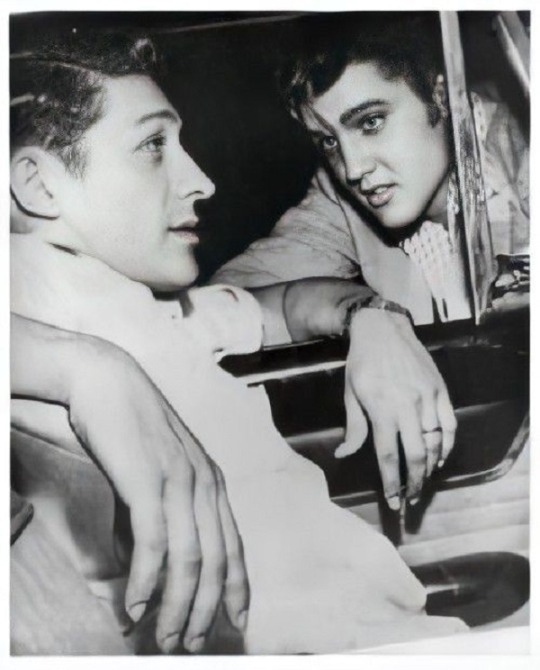
Summary: The year was 1941, bandmates and secret lovers Scotty Moore and Elvis Presley got caught red handed by Scotty’s fiancée, and this led to the young men being thrusted headlong into the China-Burma-India theater of World War II as members of the first American Volunteer Group (The Flying Tigers).
Chapter 3. Lost and Found
Pairing: Scotty Moore x Elvis Presley (m/m)
Word count: 2.4k
Warning: grieving, comfort sex, bombing of civilians
New Year 1942 brought with it new rounds of air combat for Elvis, Scotty and their squadron. They were sent back to southern Burma to reinforce the 3rd squadron there in the Battle of Rangoon. By then the Japanese had launched a full-scale campaign to take over the capital city of the British colony. To provide air coverage for the British and allied troops and to deliver ground attacks on the enemy, the Tigers had many encounters with groups of Japanese fighter planes known as “Oscars” and “Nates” and managed to come out victorious despite being outnumbered and outgunned repeatedly. In the process, the dynamic duo from Memphis was able to destroy another three enemy aircrafts with their seamless collaboration by the time spring turned around. From cousin Gene’s communication, it appeared the achievements of Flying Tigers even received a wave of publicity as part of wartime propaganda stateside, being among the few bright spots that could be gleaned from early part of the American involvement.
The overall direction of the war was not in their favor, however. The British was losing their footing in Burma to Japanese army’s advances, despite some reinforcement from the Chinese Expeditionary Force sent by the Chinese Nationalist government. After the fall of Rangoon, the Japanese ground forces began their relentless sweep northward through Burma. To aid the allies and distract the invaders, the Tigers started to take on risky missions such as carrying out air raids on Japanese bases in Thailand. Bomb racks were added to their p-40s for this purpose. In retaliation, large groups of Japanese fighter-bombers plagued the British airbases in Burma. Unsurprisingly, the Tigers began to suffer more casualties as the Burma Campaign wore on. A few good men had been lost in intense air battles or fell victim to powerful anti-aircraft artillery. Moreover, some p-40s were destroyed on the ground during enemy air raids. When their planes were damaged during battle, the parts for repair were very hard to come by. All of these factors caused the size of each squadron to dwindle and overall morale to slip. As the Imperial Army overwhelmed its ill-prepared and poorly equipped opponents during the spring months, it became more and more apparent that Japanese occupation of the entirety of Burma would be inevitable.
Despite all the setbacks in Burma and eventual retreat of his Squadron back to the southwest Chinese province of Yunnan, Elvis continued to perform well on all his missions, even managed to expand his air-to-air victory scores to five. Thus, along with Scotty who had six under his name, the former graduates from Humes High had officially become a pair of flying aces. Elvis wrote about this achievement with pride in his letters back home, jubilant over the bounty money he had earned for each kill which he would be sending to the family. Naturally he neglected to mention the precarious position the squadron was facing as the allied forces were being pummeled in this part of the world, the hardship they had to endure due to lack of supplies, or the close calls he had encountered numerous times during his air combats. He figured that Daddy and especially Mama did not need to know about these unsettling details. International mail service during wartime was shoddy at best, there was no telling if and when his folks would receive this communication. But Elvis kept writing regularly, the thought of family receiving good news like these was comforting and always served to lift his spirits.
Scotty sat on the wing of his fighter plane one day in April, inspecting the repairs the ground crew had just made to the wing guns. The Tigers were now based near the Chinese city of Baoshan, which was one of the locations near Burmese border under frequent aerial harassment by Japanese bombers and fighters. Another pilot, Joey Cooper, walked over from the direction of the barracks and stopped next to the plane, a look of concern on his face: “Hey Scotty, will ya take a look at Elvis? He got a telegram from home today, probably bad news. He was crushed and hadn’t spoken to anyone since!”
Scotty’s heart skipped a beat: “Oh no! I hope it had nothin’ to do with his Mama!!”. He jumped down from the plane instantly and ran towards the barracks. Scotty ran into two other pilots on his way there and they seemed to know automatically who he was looking for. “We tried…” One of them uttered apologetically and pointed at the entrance of the flat brick structure behind him. Scotty rushed in the door but then slowed down when he came upon the sad and lonely figure at the far end, lying in prone position with his face buried in the familiar single wire bed. His heart throbbed painfully as he started to make out the muffled sobs emanating from the young man. “Elvis, baby. What happened?” Scotty asked as he sat down at the edge of the bed.
Elvis’ shoulders shuddered for a second, then slowly he lifted his head. Tears streaming, nose running, face flushed, Elvis looked so pitiful it evoked an overwhelming sense of tender protectiveness within Scotty. He pulled his beloved over and held him tight, that was when Elvis finally made out something coherent: “Scotty, Mama is gone… I-I-I got nothin’ left no more!” He sounded so nasally it was almost like coming from another person. Scotty’s heart plunged into sorrow as the dreaded news was confirmed, he knew just how much Gladys meant to her son. He squeezed Elvis a little tighter, lightly patted his back in a soothing gesture, “I’m so sorry, baby. Life throws curveballs at us sometimes. I know it’s real rough.”
“Everyone at home were trying to keep it from me about how sick she had been. Last I heard she was amazed to hear about the Tigers in the news!” Elvis finally responded amidst a string of sniffles. He pulled back a little and that pair of large teary sapphire eyes locked up with Scotty's steely blue: “I should have seen it coming. I worried about her health but never, never thought she would leave this world so young. It’s just not her time to go.” He wiped his face messily with the back of a hand: “They said her liver and heart gave out. I know it, I worried her into an early grave!”
It pained Scotty to see his baby so lost and despondent, he had to will himself not to lean in and kiss away all his tears. He reminded himself they were in public, and anyone could walk into the barrack any time. So instead, he gently caressed the sobbing young man at the back of his neck: “Don’t think that way, honey. She was called on by God ’cause her earthly trials were done. She had been proud of you before she passed. Believe me, your Mama would want you to be strong like how she had raised you.”
With this gentle consolation Scotty stood up and walked over to the sink with a washcloth. He turned on the tap until warmth was slowly felt in his fingertips. He soaked the washcloth in water and then wrung it out before turning off the faucet. He then returned to the grieving young man who was sobbing and rambling, clasping a small, faded family picture in his hands. “Come on baby, let’s clean up your face.” Scotty sat down on the bed, nudged Elvis’ back a little and suggested. It almost felt like taking care of a small child as Scotty supported the back of Elvis’ head with one hand while using the other hand to pat his face with the slightly damp cloth. “Now there’s the flying ace Elvis Presley that I know.” Scotty joked as he tidied up the face of his flying partner and smooth out the wrinkles on his uniform.
Still looking numb and stiff from the tragic news, Elvis murmured: “I never got to see her one last time. It was all my fault, I left Satinin on her own. All those long nights she must’ve stayed up fretting for me… This is how God punishes me, he takes her away and, and I’ll never get to see her sweet face again!” His voice started to break down again while fresh tears circled in his mournful eyes.
“Listen to me, baby!” Scotty grabbed Elvis by the shoulders and shook him: “I know losing your Mama is a lot to handle, she meant the world to you. But you’ve got to toughen up for yourself and the rest of the family. You still have a lot to live for!” Staring Elvis straight in the eyes, Scotty’s tone turned from firm to tender: “I need you to be strong and brave for me, Elvis. Life is fragile, especially during wartime. Hundreds and thousands are suffering and dying all around us, but we still got each other. You are my true love; it breaks my heart to see you so heartbroken. In a few months our contract would be up with the Tigers, and we’ll get to go home then. We can go visit your Mama’s grave together and bring her flowers.”
“D-did you just call me your true love?” Elvis stammered with a stunned expression on his face. He looked so cute Scotty wished he could take him right then and there. Instead, he played it down: “You know what you heard.” “Scotty, you’ve always believed in me even when I didn’t believe in myself. Without Mama I’m lost, but you’re such a blessing.” Elvis straightened up, took in a breath before speaking resolutely: “I promise from now on I’ll be strong for you and be worthy of your love.” His sincerity was promptly rewarded by a warm hug from Scotty, who managed to sneak in a kiss on the forehead too.
Elvis was given the next two days off for bereavement. Scotty was excused from regular duty as well, specifically tasked to cheer him up since it was obvious that only Scotty could prevent Elvis from crumbling psychologically. Both were now suffering from lack of sleep because it took most of the night for Scotty to calm Elvis’ sobbing and coax him to sleep. Elvis also lost all appetite ever since the terrible news. Far too quiet to be normal, he was noted by others to be often lost in thoughts. Taking account of all this, Squadron leader Tex encouraged Scotty to find Elvis some “distractions”. The implication was for the older pilot to take his grief-stricken partner to Baoshan city to seek some pleasure in brothels. Naturally the two lovers spent the precious time off with each other instead.
The owner of Changrong Inn smiled knowingly at the two tall American soldiers who checked into his modest hotel. Mr. Sun was fond of the foreign couple who had stayed a night here occasionally over the last month or two. They were polite and discrete, never got drunk or caused a fight, and most importantly, tipped well. He had even suggested some choice local eateries and nearby sightseeing locations to the nice young men. Business was slow over the last few years in this Chinese city under constant threat of Japanese invasion. Mr. Sun wished he had more wealthy and trouble-free tourists like these for customers, what they did behind closed doors was no concern of his. The thought was pushed aside as he handed the keys of one of his nicest rooms to the Americans.
Once inside the room and isolating themselves from the rest of the world, Scotty and Elvis were immediately locked in passionate kisses, hands going under shirts and fondling up and down bare shoulders and backs. They pressed their bodies against each other so tightly it felt like they almost melted into one. It took considerable patience and willpower for Scotty to unbutton and undress his lover properly. Elvis on the other hand was not so patient. He only managed to take off Scotty’s jacket and unzip his trousers. When guitar slinger’s already excited member popped out of his clothes, Elvis’ knees became weak and wobbly. He could feel the radiating heat and pulsing veins as he took the growing organ into his hands. With barely a push down on his shoulders, Elvis kneeled down at Scotty’s feet and kissed him on the tip. Licking along his length and lapping up his precum, there was a streak of desperation in those beautiful eyes as Elvis eagerly wrapped his mouth around Scotty and took him down as deep as he could. Scotty knew at that moment that Elvis needed him just like roses needed rain. He was the only one who could fill up the gaping hole which was in the young man’s heart, and make Elvis feel alive again.
Tears of contentment and gratification streamed down Elvis’ face as he let his lover use him any way he pleased. The more seasoned pilot kept his hands buried in those soft locks of light chestnut hair and held that pretty head still. He pushed against the back of Elvis’ throat repeatedly until a mind-numbingly satisfying release inside of his younger partner.
Twice more Scotty would spill his seeds within his gorgeous lead singer that night by the time their romp in bed was over. Elvis reached his own climax while being slammed from behind as he laid beneath Scotty. While he slipped into restful sleep for the first time since three days ago, he vaguely remembered being sponged clean caringly by his guardian angel, and the overwhelming sense that Scotty was what makes his life worth living in this lonely and perilous world.
The couple’s peaceful slumber was shattered by loud sirens as morning came around. This was soon replaced by sounds of explosion, low-flying bombers and screaming civilians as they were cut down by strafing machine guns. Scotty shouted: “Air raid!” In the blink of an eye, he pushed Elvis down one side of the bed and then rolled down himself only seconds later. As the pair huddled under the bed, their room shook for a few moments due to a stray bomb which landed within the confines of the Changrong Inn itself. A cloud of smoke and panicked cries could be heard rising out of the east wing of the little hotel. The rumbling of distant artillery suggested ground troops were not far from the city. The lovers embraced each other without words, both knowing in their hearts that Japanese army was moving closer, a full-scale confrontation was soon to come.
10 notes
·
View notes
Text
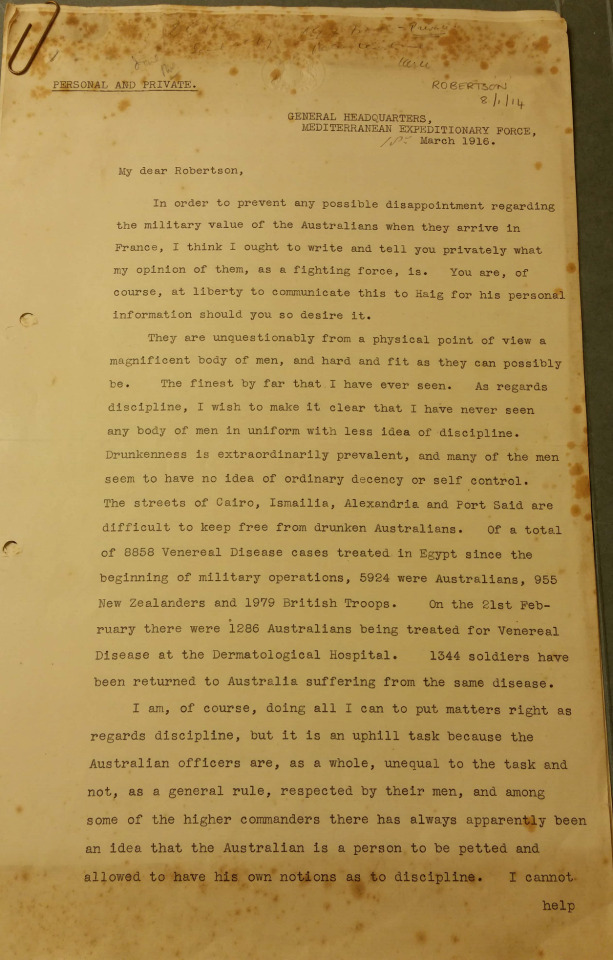
Just before the Australian divisions were sent from Egypt to France in 1916, General Archibald Murray, commander of the Mediterranean Expeditionary Force, sent this letter to Wully Robertson, Chief of the Imperial General Staff. In it Murray is pretty scathing about the Australians, criticising their discipline, leadership, morals, and egotism.
To me it demonstrates the clear disdain British regulars had for the Australians as soldiers who may have been brave, but were ultimately unsoldierly. It also shows that this wasn't a universal view of all "colonial" troops, and in particular didn't apply to the other half of Anzac, the New Zealanders.
"In order to prevent any possible disappointment regarding the military value of the Australians when they arrive in France, I think I ought to write and tell you privately what my opinion of them, as a fighting force, is. You are of course, at liberty to communicate this to Haig for his personal information should you so desire it.
They are unquestionably from a physical point of view a magnificent body of men, and hard and fit as they can possibly be. The finest by far that I have ever seen. As regards discipline, I wish to make it clear that I have never seen any body of men in uniform with less idea of discipline. Drunkenness is extraordinarily prevalent, and many of the men seem to have no idea of ordinary decency or self control. The streets of Cairo, Ismailia, Alexandria and Port Said are difficult to keep free from drunken Australians. Of a total 8858 Venereal Disease cases treated in Egypt since the beginning of military operations, 5924 were Australians, 955 New Zealanders and 1979 British Troops. On the 21st February there were 1286 Australians being treated for Venereal Disease at the Dermatological Hospital. 1344 soldiers have been returned to Australia suffering from the same disease.
I am, of course, doing all I can to put matters right as regards discipline, but it is an uphill task because the Australian officers are, as a whole, unequal to the task and not, as a general rule, respected by their men, and among some of the higher commanders there has always apparently been an idea that the Australian is a person to be petted and allowed to have his own notions of discipline. I cannot help feeling depressed when I look at these magnificent men. They are a force which would have made incomparable soldiers if properly taken in hand by British officers when they arrived, and who have been nearly spoilt by neglect on the part of their commanders to instil into them even the rudiments of soldierly instincts. Matters have now been allowed to go on for so long that I fear it will not be easy to remedy the present state of affairs. As regards the general training of the Australians as distinct from trench warfare, practically nothing was possible from this point of view whilst they were on the Peninsula, and previous to their arrival there apparently they had only undergone very partial training. Everything possible has been done during the last two months to prepare them for warfare in France, but there is leeway to make up and of course their lack of discipline and the inefficiency of their officers are a very great handicap, as is their enormous conceit in themselves. It has been so long the custom in the newspapers to laud the Australians as the finest soldiers in existence that it is very difficult now to convince them that they know very little of warfare. Frankly, I am anxious when I think of what may happen when they get to France on the march and in the towns and villages where they are billeted. Their Staffs will have a heavy task should they have to organise an operation where prolonged march discipline, as well as other discipline, is essential. Of the magnificent bravery of the Australians, of course, there is no question, but if they have to take part in operations such as we have seen in France, their want of complete training, their lack of discipline and absence of soldierly, distinct from fighting, instinct may, I fear, involved them in unnecessarily heavy losses. My remarks chiefly apply to the Australians and not to the New Zealanders, who are in many respects superior to the Australians except in physique."
17 notes
·
View notes
Text
The third battle of Centro ( 16/02/79)

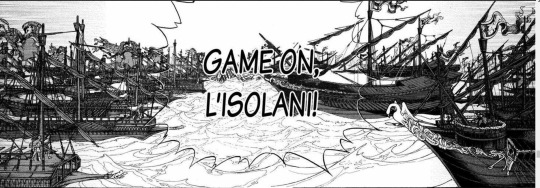
The Third Battle of Centro, also known as the Phoenician War, was fought on the 16th of the month of Tencere, in the year 79 CTR, between a combined fleet consisting of the Knights of Rhodes, Sicilia, Naples, Genoa, Balt Rhein, and Li'solani, against the fleet of the Turkiye-Venedik alliance in the sea of Centro, near the city of Phoenicia. This was the third round of fighting in the entire conflict at sea between the two powers, in an attempt by the Imperial and Crusader alliances to dominate the waters of Centro after the failure of the land invasion of Sud. The Turkiye-Venedik fleet won a landslide victory, killing many of the Crusaders' commanders, capturing most of their warships, and taking many prisoners and booty. This battle was the end of the Balt Rhein Empire's dominance of the Centro and the loss of its vassal state on the island of Crete. It also had a major impact on the first appearance of the Turkiye naval dominance as the new ruler of the Centro Seas.
Power map of Balt Rhein Turkiye after the battle of Cinza.
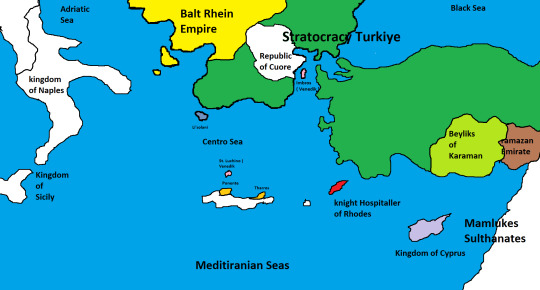
several Countries in Centro and Mediterranean Before a Battle.
Prime Minister Louis of Balt Rhein was still not giving up his passionate determination to continue fighting Turkiye. even though the expeditionary force sent to Sud was destroyed. while according to miller, (who argues that the expedition to Sud was not at the direction of St Michael) Louis once again used his bet to be able to take Sud by sea. His strategy was to cut off all Turkiye lines of communication and supplies by taking control of Centro so that he could directly threaten Imbros (a Venedic colony) and Constantinople. Louis mediated with Pope Nicholas V to organise another Crusade. Despite Rome's difficulties in mobilising the masses, due to internal conflicts in western Europe, the pope's invitation was successful in getting Genoa, Sicily, Naples and the Hosipitaller Knights of Rhodes to form an alliance.
On 22 Lale, 79 CTR, the Naples and Sicily Fleets of 100 galleys each besieged Li'solani. Donattello Doria immediately surrendered, and asked for security guarantees. even offered military assistance in order to fight the Türkiye and Venedik. thus, Li'solani broke out of his agreement with the Türkiye 2 years ago that they had signed themselves. Donatello's betrayal reached the venedik and received a strong reaction from Antonio Lucio, Doge Venedik. Antonio conveyed this news directly to Constantinople. in response to this Zaganos Pasha ordered careful military preparations to Hamza Pasha as the Kapudan Bahriye who was positioned in Phoenicia. in order to mobilise his fleet.
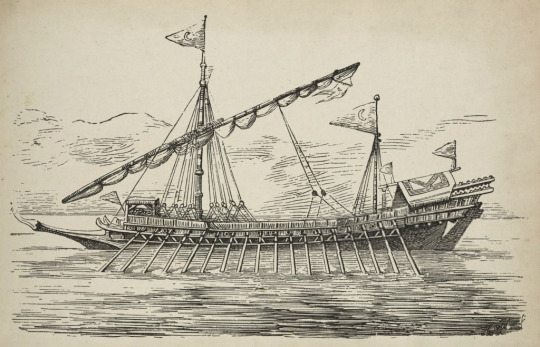
Turkiye Galleys in 15th Century
In addition to taking control of Li'solani, the crusader fleet attacked any ship passing through the western centro. It did not even distinguish which ships belonged to Turkiye from those belonging to their own allies. On the 28th, there was an incident of robbery of a venedic merchant ship by the crusader fleet. The raids expanded to reach Ponente, Tharos, and St. Lucino. The two countries on the island of Crete decided to submit to the crusaders. facing the worsening situation in Centro. Antonio Lucio decided to make military preparations. The levy of goods was increased, and soldiers and archers were recruited. Marco Quirini, one of the Venedic commanders who participated in the first Centro War, was appointed Commander in Chief in place of Silvestro Brega. at the head of the Venedic Fleet mobilised in Imbros, consisting of 150 galleys.

Various Types of Venetian Ships
On the 3rd of Tencere, Hamza Pasha ordered the addition of 150 galleys in Phoenicia and immediately accelerated the mobilisation. With this new navy, Hamza Pasha tried to get out of Phoenike Harbour and met a small part of the crusader fleet that was coincidentally trying to get closer to Phoenike for the sake of looting. A brief battle ensued, and Hamza Pasha was able to repulse the invaders' attack. From this brief battle, Hamza Pasha realised that it seemed that the crusaders were attacking without any coordination or prepared strategy. So there was a possibility of winning the battle.
The next day, the Balt Rhein Imperial Fleet, led by Andreas Patarini, left the vessels for Li'solani, where the Crusader Fleet was supposed to be assembled. In the evening, a council of war was held. A dispute ensued over who would command the combined Crusader Fleet. Andreas put himself forward to lead the fleet. However, the majority of the Sicilian and Genoese forces voted against him. The Genoese instead put forward Giustiniani (their warlord, who was rumoured to have disappeared after the battle of Gallipoli, 77 CTR) to lead their leet. It is known that Giustiniani did not die and managed to survive his humiliating defeat and escape to Rhodes. Giustiniani is currently on his way to lead the Hospitaller Knight Fleet to Li'solani to answer the call of the papal alliance.
However, the Giustiniani's arrival was very slow due to a westerly wind that was contrary to the direction they were travelling. Five days later, on Tencere 8, Giustiniani arrived at Li'solani and immediately convened the council of war once again. Provveditore Venier (Capitan of Naples), Albano Capello (Genoa), and Poei Manfredi (Li'solani) urged a direct attack on the Turkishye Venedik forces towards their headquarters, i.e., Phoenicia, given that both fleets were not yet fully organised. But Giusitiniani was hesitant about this proposal and preferred to target an easier target, i.e., the city of Chielo or the city of Scoglio. This proposal was supported by the commanders of the Balt Rhein. The crusader commander accused the Balt Rhein of greed and stubbornness, wanting only the result of the war for themselves. The division among the councils of war continued into the night. Nevertheless, Giustiniani finally supported the first opinion. and decided to reorganise his fleet, getting ready to face the Combined Turkiye-Venedik Fleet.
Battle
The fleet of the Crusader Alliance, consisting of 400 ships (according to Marino Satino), 200 galleys from Balt Rhein, 40 from Rhodes, 30 from Li'solani, 80 from Sicily, 30 from Genoa, and 20 from Naples. (Among all the ships, those of Genoa and Naples were the largest.) The movement of the Crusader fleet towards the battlefield was very slow due to the lack of wind. and the fleet only departed on the 12th. Meanwhile, the Venedic Turkiye Combined Fleet arrived in Phoenicia, consisting of 300 ships. The Turkish ships were dominated by small galleys (and no large ships), totaling 150 galleys. supported by the Venedic Fleet (100 Galleys, 20 Formosse, and 30 Mescolare). Hamza Pasha was appointed Commander-in-Chief of the Combined Fleet. and prepared to organise his battle formation. upon hearing that the Crusader Fleet was moving towards Phoenicia.
The two fleets met on the Phoenicia Sea Route on the 16th. Seeing that the enemy forces had more fleets and larger ships, Hamza Pasha decided to face his galleys against the galleys of the Balt Rhein and Rhodes. while the Venedic forces faced the Genoese, Naples, and Li'solani. The two ships approached each other and began to fire arrows. Hamza Pasha arranged the formation of his galleys close to the enemy galleys so as to make it easier for his soldiers to fight each other, like a war on land. The war continued with mutual sword-slashing and arrow-shooting for a long time, turning into a frightening, bloody battle. The Imperial troops tried to break free from the oars of the Turkiye galleys. However, the two galleys had already docked and could not be released. Despite the bumpy and unstable tidal waters, the Turkiye troops were able to take control of the situation. and killed many of the Empire's marine troops. The Balt Rhein troops were in disarray as their commander, Andreas Patarini, was killed, so they decided to retreat, leaving their allies without a second thought. According to Satino, Andreas staggered on his ship due to the tide. then fell into the sea and drowned.
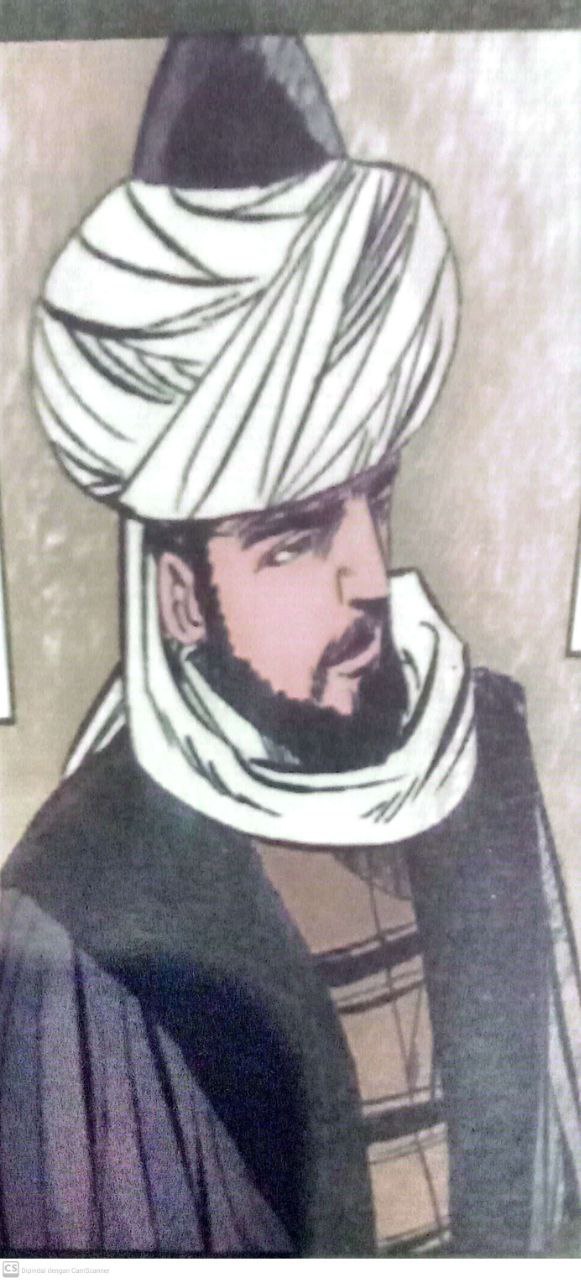
Hamza Pasha General Commander of the Turkiye-Venedik Fleet
On the other hand, the Venedic battles against Naples, Genoa, and Naples are still ongoing. The Naples ships had difficulty keeping their fleet formation. So Marco Quirini took this golden opportunity to close his ships with the Naples ships. Provveditore Venier ordered his ships to retreat for a while in order to draw the Venedic forces further away from their gallai and thus separate them from the Main Fleet. The ships of Naples fought back by advancing ahead of the Venedik fleet; one of its commanders, Girolamo Minotto, misinterpreted Provveditore Venier's signal to stay away, according to Satino, and attacked the Venedik flagship instead. Seeing the tactical failure of the Naples forces, the commander of the Venedik Galleries, Lorenzo Festa, laid siege to the Naples Fleet. while Gianpaolo Cavallo attacked the Li'solani Galleries to separate them.
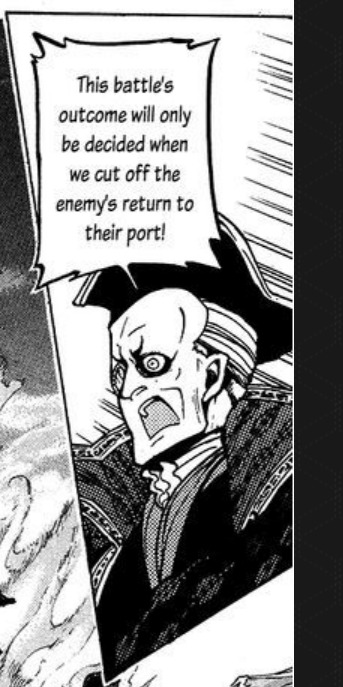
Marco Quirini commander of the venedic navy, who replaced Silvestro Brega.
Seeing the chaos in the formation of his battle fleet, Giustiniani tried to help by mobilising his remaining reserve ships. in order to release the blockade of the Venedik Force over the Naples troops. However, the Turkiye Galley, led by Hass Murad Pasha and Mesih Pasha, came from the side and intercepted the Genoa ships. The Genoa ships were able to match the Turkiye ships in battle by relying on the large size of their ships. thus being able to escape the interception. Venier himself was badly wounded by the many arrows that pierced him, feeling unable to continue the battle. He decided to withdraw his fleet and retreat. although the effort was quite impossible. However, Venier was able to make a feint with some of his crew by disguising himself as a common soldier and escaping with some of his ships that managed to escape the siege.
As a result, the Genoese and Rhodesians were left alone. This angered Giusitiniani. upset, he decided to return to Li'solani. hoping that he could avenge his painful defeat at the Sea of Phoenicia. This third Centro Sea battle lasted from dawn to sunset. The combined Turkiye-Venedik fleet was finally able to defeat the Crusader fleet. Many captains and crew members of enemy ships were killed and taken prisoner. and captured 57 galleys and 10 galleons, according to Satino's records. while the rest were destroyed during the battle. while the Egyptian historian, Maqrizi, says the number reached 40. Nicollo (one of the Venedik historians who participated in the war) details the ships captured by the Venedik forces. Lorenzo Festa captured 70 galleys belonging to Li'solani, while Marco Quirini captured 10 galleons belonging to Naples and one flagship galleon belonging to Genoa. The record of warships captured by the Turkiye is not mentioned by Nicollo except based on Maqrizi's account. The Turkiye captured 57 galleys, or at least 40 galleys, belonging to the Balt Rhein and 22 galleys belonging to Rhodes and Li'solani. Casualties on the Turkiye and Venedik sides reached at least 4000 men. on the enemy side, as narrated by Maqrizi, reached 30000 men. Most of the casualties were from the Balt Rhein.
Aftermath
Four days after the third Centro battle, Hamza Pasha and Quirini organised a pursuit of the fleeing Crusader fleet. The Turkiye-Venedik fleet approached the island of Crete and laid siege to Tarros and Ponente, which were the bases of the Balt Rhein Fleet's escape. After more than five days of siege, both cities were defeated. ending both city governments and entering into Turkiye domination. Hamza Pasha captured eight generals of the Balt Rhein superintendent and some resisting troops and executed them. Next, on the 27th, the Turkiye Venedik Fleet moved towards Li'solani through the Witch Straits to shorten the journey. Giustinianni had taken full command of the city's controls and taken Donatello Doria prisoner in his own palace, then prepared for the final battle.
On the 28th, fighting broke out again around Li'solani waters. The Genoese and Li'solani Fleets put up a vigorous resistance to the attacks of the Turkiye-Venedik Fleet, destroying parts of their galleys. Giustiniani tried to keep the enemy fleet away from the island, but was unsuccessful. Due to the unstable wind direction, the situation was reversed when the wind direction actually blew to the west, which brought the Genoese and Li'solani ships closer to land. The Turkiye-Venetian fleet took advantage of this opportunity by showering them with fire arrows in order to burn their ships and surrounded them. Giustiniani was forced to change his strategy by adopting defensive tactics in the fortress. The Turkiye troops carried out the siege from the 1st to the 6th of Raki. Li'solani decided to surrender. Despite Giustiniani's ingenuity, he was able to defend the city and thwart two consecutive attacks by the Turkiye-Venedik fleet. Due to the discontent of the inhabitants and merchants, they wanted the Genoese to withdraw from their city.
Hamza Pasha accompanied by the Janisaries entered the city on the 6th and ordered the troops to spread out, in search of Giustiniani. However, they did not find him. Most likely, Giustiniani had escaped with 700 of his troops by robbing some of Li'solani's Galleys and then returning to Italy. Hamza pasha then stormed Donatello's palace and arrested him while expressing his anger for betraying the Anti-Imperial Tripartite that had been agreed 3 years earlier. in return, Hamza Pasha placed Donatello's son, Antonio Doria as the new Li'solani ruler. signifying the end of the independence of the Li'solani government. and transformed into a Vassal state under the auspices of Turkiye.
The victory at Centro marked the beginning of the fledgling Turkiye naval supremacy that would continue to develop until the end of the Stratocracy and the return of the Ottoman Empire. Nicollo says that although the Turkiye lacked the quality of ships capable of matching the Venediks, Genoese, and Li'solani, and their ships were mostly small galleys, their rowers were adept at mobilising them according to the tide and wind direction. Hamza Pasha's strategy, docking fellow galleys until the transfer of rowing troops to enemy ships, and the ambush of the Genoese ship, which was in fact larger, made the Venedik commander, who witnessed the Turkiye way of war for the first time at sea, truly amazed. seen, several times the Turkiye troops applied the strategies of the Venedik troops themselves. One of them was pouring oil or soap on the enemy's deck to throw off their balance when moving. Or, the troops' shoes were coated with sand so that they could walk on the soap. Because of this, Nicollo commented, "This tribe of horsemen has learned something from us.".
According to Seth Perry, "the destruction of the Crusader Fleet at Centro emphasised the influence of Turkiye, this time not only dominating the land but also the sea. This was evidenced by the conquest of Tarros, Ponente, Li'solani, and finally Vessels. making Turkiye a major player in naval warfare. next to Venedik, Li'solani, and Genoa.
#shoukoku no altair#altair a record of battles#kotono kato#kato katono#navy#fanfic#fan fiction#ottoman#centro#zehir zaganos
3 notes
·
View notes
Text
"In August 1945, the capitulation of the Japanese forces before the Soviet Army and the Allied forces, put an end to the world war. The defeat of the German and Nippon fascists was the beginning of a great weakening of the capitalist system. After the great victory of the Soviet Union, many people's democracies saw the light of day. The socialist system was no longer confined within the frontiers of a single country. A new historic era was beginning in the world. In view of these changes, in Viet Nam, the Indo-chinese Communist Party and the Viet Minh called the whole Vietnamese nation to general insurrection. Everywhere, the people rose in a body. Demonstrations and displays of force followed each other uninterruptedly. In August, the Revolution broke out, neutralising the bewildered Nippon troops, overthrowing the pro-Japanese feudal authorities, and installing people's power in Hanoi and throughout the country, in the towns as well as in the countryside, in Bac Bo as well as in Nam Bo. In Hanoi, the capital, in September 2nd, the provisional gouvernment was formed around President Ho Chi Minh ; it presented itself to the nation, proclaimed the independence of Viet Nam, and called on the nation to unite, to hold itself in readiness to defend the country and to oppose all attempts at imperialist aggression. The Democratic Republic of Viet Nam was born, the first people's democracy in South-east Asia. But the imperialists intended to nip the republican regime in the bud and once again transform Viet Nam into a colony. Three weeks had hardly gone by when, on September 23rd, 1945, the French Expeditionary Corps opened fire in Saigon. The whole was to be carried on for nine years at the cost of unprecedented heroism and amidst unimaginable difficulties, to end by the shining victory of our people and the crushing defeat of the aggressive imperialists at Dien Bien Phu. … Never before had there been so many foreign troops on the soil of Viet Nam. But never before either, had the Vietnamese people been so determined to rise up in combat to defend their country." - Võ Nguyên Giáp, People’s War, People’s Army (1962)
2 notes
·
View notes
Text
Sabaton wrote a song about this.
The men of the Brazilian Expeditionary Force served with distinction in Italy,ending up fighting alongside Indian troops, soldiers from the Commonwealth nations like New Zealand and South Africa, Free Polish forces, French Colonial units from North Africa and Senagal, and Japanese-American and African-American formations.
In no place was the sheer scope of power arrayed against the Axis more obvious then Italy, where soldiers from six of the seven continents fought and died. Side by side.
Fun fact: Brazil joined the Allied powers to liberate Italy from the Nazis late during WW2. Our troops were incredibly unprepared and frankly had no expectations of ever fighting in the war. But when they got there, the Brazilian troops were apparently so fucking chaotic and batshit crazy that it even frightened the Nazis. This is what a German captain had to say about it:
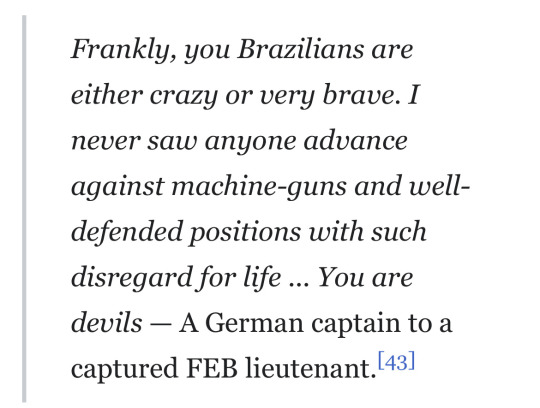
6K notes
·
View notes